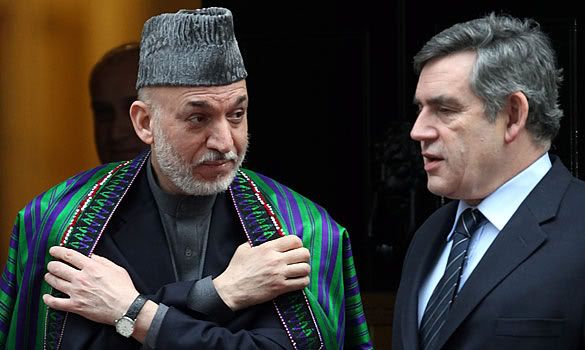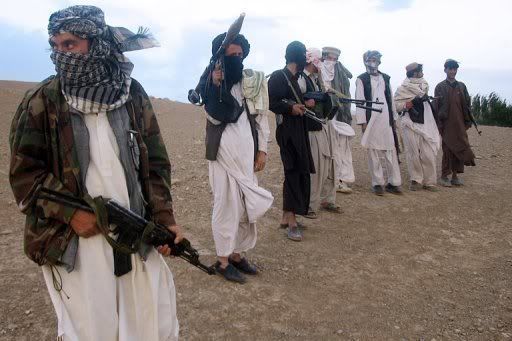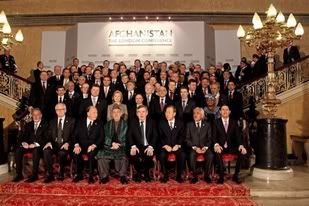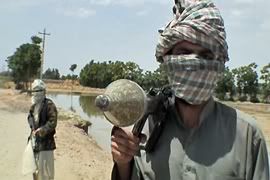
Hamid Karzai and Gordon Brown in Downing Street this morning.Hamid warn that Afganishtan require 15 years of help to recover and rebuild.

The Taliban have been unmoved by talk of peace overtures . Said it is war mongers meeting to deceive and continue to occupy Afganisthan.

Security, reconciliation and withdrawal of foreign forces by 2015 were key policy announcements

Whether Taliban would accept an invitation to a 'peace jirga' is a mute point.
The Afghan Taliban on Thursday dismissed the London conference on Afghanistan as a propaganda ploy and said the summit will fail to produce results, the SITE monitoring service reported.
"The war-mongering rulers under the leadership of (US President Barack) Obama and (British Prime Minister Gordon) Brown want to deceive the people of the world by holding the London conference to show that people still support them," SITE quoted an Internet statement as saying.
If the decision is taken to "once again try to prolong the military, economic, cultural and political occupation of (Afghanistan), this conference will be a mere eye-wish like other conferences."
The London conference, which aims to chart the way forward in Afghanistan, opened on Thursday with nearly 70 countries and organisations taking part.
The Taliban must deny sanctuary to Osama bin Laden before Saudi Arabia will agree to act as a mediator in any Afghan peace deal, the kingdom's foreign minister said on Thursday.
Prince Saud al-Faisal was responding to Afghan President Hamid Karzai who had called on Saudi Arabia, which has hosted talks between Afghan government and Taliban representatives in the past, to help bring peace to Afghanistan.
"Unless the Taliban give up the issue of sanctuary (to bin Laden) I don't think the negotiations with them will be possible or feasible to achieve anything," Prince Saud told reporters on the sidelines of a London conference.
"We have two conditions for Saudi Arabia's involvement: that the request comes officially from Afghanistan and the Taliban has to prove its intentions in coming to the negotiations by cutting their relations with the terrorists and proving it," he said.
"By keeping their contacts with bin Laden they won't be coming to any negotiations with a positive attitude.
POLICY CHANGE
Saudi Arabia froze ties with the Taliban in 1998 over the group's refusal to hand over bin Laden, who had been stripped of his Saudi citizenship for militant attacks in the oil-producing kingdom and activities against the al-Saud royal family.
"I think the important theme in this conference is the intention to change policy in Afghanistan, a recognition first that the settlement in Afghanistan is not going to be a military question alone but there has to be a political and economic side to the settlement," Prince Saud said.
"If peace is brought between Afghans and the terrorists are isolated then the war against the terrorists would be successful," he added.
The United States has insisted that insurgents can only be included in a political settlement if they sever all ties with al Qaeda, renounce violence and respect the Afghan constitution.
Karzai said that Afghanistan needed the support of its neighbours, particularly Pakistan, to secure peace.
Pakistan, Saudi Arabia and the United Arab Emirates were the only three countries to recognise the Taliban government before it was ousted in the U.S.-led invasion in 2001.
Asked whether Saudi Arabia shares the concern of the West and other allies that Iran's nuclear programme is aimed at building an atomic bomb and not for creating electricity as Tehran claims, Prince Saud said:
"If they are working on a peaceful nuclear programme they certainly have a strange way of showing it. All the countries that are working on a peaceful programme are not acting like Iran.
"There is one sure way of stopping that, that is to take a decision at the Security Council that no weapons of mass destruction, nuclear or otherwise will be allowed in the Middle East and that includes Israel."
Control over some of Afghanistan's provinces is to be handed over to the Afghan government by the end of 2010, according to foreign ministers attending a one-day international conference in London.
UK Foreign Minister David Miliband said on Thursday that 2010 was a "decisive" year because a new government was in place, adding that security of all provinces would be under Afghanistan leadership within five years.
Miliband also announced a new fund to allow the Afghan government to woo Taliban fighters away from the conflict.
"Today alone there have been over 140 million dollars worth of commitments for the first year of the national reintegration programme and we are committed to seeing that through," Miliband said.
In a communique published at the end of the conference that was attended by delegates from 70 countries, support was also offered for the continued growth and expansion of the Afghan National Army and police force.
Delegates agreed a target of recruiting some 171,600 soldiers and 134,000 police officers by October 2011.
But Hillary Clinton, the US secretary of state, said that plans to gradually transfer Afghan security from international to domestic forces was "not an exit strategy".
"We . . . support the NATO transition plan," Clinton said. "But I want to make clear - to Afghans, to our partners, to our citizens, and to the extremists who hope for our failure: This is not an exit strategy."
Taliban reaction
Taliban dismissed the London conference as a propaganda ploy, saying the summit would fail to produce results, according to the AFP news agency, quoting an internet statement.
"The war-mongering rulers under the leadership of [US President Barack]Obama and [British Prime Minister Gordon] Brown want to deceive the people of the world by holding the London conference to show that people still support them".
If the decision is taken to "once again try to prolong the military, economic, cultural and political occupation of [Afghanistan], this conference will be mere wishful thinking like other conferences."
The statement also dismissed a plan by Hamid Karzai, the Afghan president, to woo Taliban moderates with offers of money and jobs.
"They announce that they will provide money, employment and opportunity to have a comfortable life abroad for those mujahedeen who agree to part ways with jihad," the statement said.
"This is baseless and futile," it said. "Had the aim of the mujahedeen of the Islamic Emirate been obtainment of material goals, they would accept dominance of the invaders in the first place."
Presidential view
Earlier on Thursday, Karzai said that his country must reach out to its "disenchanted brothers" in an effort to stabilise the war ravaged nation, saying fighters who are "not part of al-Qaeda or other terror groups" must be reconciled with the government.
The Afghan leader said his government would set up a national council for peace and reconciliation, and has asked Saudi Arabia to help guide the process.
Karzai was seeking support for a $1 billion plan that would offer cash, jobs and other incentives to the Taliban and fighters in other armed groups, in an attempt to bring them back into mainstream society.
Taliban fighters have also been invited to a "peace jirga", or a traditional gathering of tribal elders, expected to be held early this year, a government spokesman confirmed.
Saudi role?
Hamid Elmi, Karzai's deputy spokesman, said: "We are using all kinds of possibilities - our neighbouring countries, the international community, the king of Saudi - to encourage the Taliban to come".
However, Saudi Arabia said on Thursday that it would only take part in Afghan peace efforts if the Taliban denies sanctuary to Osama bin Laden, the al-Qaeda leader, according to the kingdom's foreign minister.
"Unless the Taliban give up the issue of sanctuary (to bin Laden) I don't think the negotiations with them will be possible or feasible to achieve anything," Prince Saud al-Faisal told reporters on the sidelines of a London conference.
"We have two conditions: that the request comes officially from Afghanistan and the Taliban has to prove its intentions in coming to the negotiations by cutting their relations with the terrorists and proving it."
But Haroun Mir, deputy director for the centre for research and policy studies in Kabul, told Al Jazeera that Karzai's proposal could be hampered by plans to increase the number of foreign troops in Afghanistan.
"Karzai has been talking for a long time for reaching out to the Taliban.
"But ... the US military surge and additional Nato forces in Afghanistan in the coming months [will see] the intensity of fighting increase.
"I don't know how president Karzai could implement his own strategy of reaching out to the Taliban if there is increased fighting going on in Afghanistan," he said.
Secret talks
And Abdullah Abdullah, the presidential candidate who withdrew from last August's fraudulent elections, said obstacles remain to implementing such a policy.
"I don't think the Taliban at this stage are willing to enter negotiations. Also, their association with terrorist organisations, like al-Qaeda - that's the main issue at the moment - and they are working like one organisation."
Thursday's conference comes nearly a week after a meeting between Afghan government officials and members of an armed opposition group fighting alongside the Taliban.
Al Jazeera's David Chater, reporting from Kabul, said the talks were held with the group Hezb-e-Islami, in the Maldives islands, between January 23-24.
He said a Taliban leader had been due to attend the meeting but dropped out in the last minute citing health reasons.
President Karzai of Afghanistan warned today that his country's security forces would require another 15 years of Western support before they are able to sustain themselves.
Ahead of the opening of the London Conference on Afghanistan, Mr Karzai told the BBC that he foresaw a gradual reduction in support over a lengthy timeframe.
“With regard to training and equipping the Afghan security forces, five to 10 years will be enough,” he said. “With regard to sustaining them until Afghanistan is financially able to provide for our forces, the time will be extended to 10 to 15 years.”
His comments were at odds with the tone of Gordon Brown’s opening address to the conference, which sought to stress a timeframe of less than a year until Western forces begin a transition of responsibility to their Afghan counterparts.
The Communique that will end the conference, a document already leaked to The Times, forsees a gradual transfer starting late this year or early next in the more benign provinces. Afghan forces will be in the lead of the majority of provinces within three years and overall control will pass to Afghan forces within five years.
Concurrent with the military surge, led by 30,000 new US troops, the Prime Minister set out details to leaders from more than 60 countries of a complementary “civilian and political surge” that will include a drive to reconcile and reintegrate Taliban fighters.
After a bloody year for Nato forces in Afghanistan, during which 520 troops died including 108 from Britain, Mr Brown told delegates: “By the middle of next year, we have to turn the tide in the fight against the insurgency.”
Standing alongside Mr Karzai, the Prime Minister went on to detail plans that Western leaders hope will lead to the reintegration of what the Afghan President called the “disenchanted brothers” of the Taleban.
The Prime Minister detailed a new £500million fund that is to offer inducements to Taleban fighters who promise to lay down their arms and sever their ties with Al-Qaeda and other terrorist networks.
The exact nature of the proposed engagement remains unclear, with Afghan officials and some British officials appearing to push a more conciliatory line than is coming from Washington.
Speaking at the start of the conference President Karzai told leaders that he wished to “reach out to all” and asked that the Saudi leader King Abdullah act as an intermediary in a process of engagement with the Taleban leadership. Saudi Arabia, one of only three countries to recognise the original Taleban government, has played a discreet role in previous unofficial talks between the Karzai government and representatives of the Taleban
The Pentagon spokesman Geoff Morrell said yesterday that any reconciliation with the Taleban leader Mullah Mohammad Omar was "probably a bridge too far" after he gave safe haven to al-Qaeda to launch the September 11, 2001, attacks on the United States.
"He has the blood of thousands of Americans on his hands," he told reporters in Washington.
But Mark Sedwill, the former British Ambassador and newly appointed Nato civilian representative in Afghanistan, suggested that talks with the Taleban would inevitably lead to engagement with “unsavoury characters.”
"If we are going to bring conflicts like Afghanistan, civil conflicts, to an end, that means some pretty unsavoury characters have to be brought within the system," he said.
The Taleban has been dismissive of suggestions that fighters can be “bought” by the new plan and today restated on its website that the withdrawal of Western forces is a precondition to any negotiation with the leadership. However, the insurgent movement has been careful in recent months to distance itself from Al-Qaeda’s agenda stressing that it poses “no threat to the West”.
Among the measures that are to accompany the reconciliation drive as part of a concurrent “civilian surge” in Afghanistan are plans for a new training programme for some 12,000 Afghan bureaucrats, a key deficiency in a country beset by both literacy rates of less than 30 per cent and endemic corruption. Agriculture, the mainstay of the Afghan economy, is to receive another £72 million from the British taxpayer.
As the West tries to accelerate a transition to Afghan control that will provide an ultimate exit strategy, Mr Brown said that the proportion of development money channelled through the Afghan government is to be increased to 50 per cent of the total, a move matched by Afghan government commitments to clamp down on endemic corruption. The International Monitory Fund and the World Bank are to announce further debt relief for Afghanistan totalling $1.6 billion.
British police training and mentoring teams are to be doubled from April, Mr Brown said, as part of an international effort to build Afghan forces that will see the Afghan Army expanded from 134,000 this October to 171,600 by October 2011. The Afghan police are to grow in number from 109,000 in October to 134,000 by October 2011.
-----
-----
------
-------
--------
------





0 comments:
Post a Comment